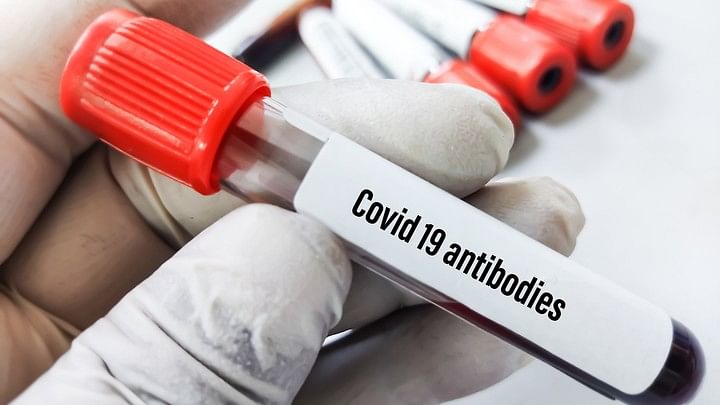
Representative image showing Covid-19 antibodies
Credit: iStock Photo
The Wuhan Institute of Virology in China was blamed for being the origin of the Covid-19 pandemic which claimed millions of lives and resulted in multiple lockdowns.
Now, when nations have surpassed the pandemic, researchers at the Wuhan lab have made a new nanovaccine which assures universal protection against all major Covid variants and even future mutants.
According to a report by South China Morning Post, the existing vaccines help in prevention of Sars-CoV-2 and reduce fatality rate, but do not provide universal protection against all mutants of the virus, the team which prepared the new vaccine claimed.
Combining Covid epitopes (antigens that trigger the human immune system) along with ferritin (blood protein) could develop an intranasal nanoparticle vaccine that can shield against multiple Sars-CoV-2 variants, asserted the team of researchers.
Tested on mice, the new nasal vaccine, presented the capacity of providing long-lasting and wide protection against different types of coronaviruses, which could prevent the spread of future mutant variants.
According to SCMP, in a journal named ACS Nano which was published in June, the researchers wrote, "The ongoing and future pandemics caused by Sars-CoV-2 variants and mutations underscore the need for effective vaccines that provide broad-spectrum protection."
"Our constructed nanovaccine targeting the conserved epitopes of the pre-existing neutralising antibodies can serve as a promising candidate for a universal Sars-CoV-2 vaccine."
How was the intranasal nanoparticle vaccine created?
According to SCMP, the team combined epitopes (short peptides with conserved sequences in S2) with ferritin, which is derived from Helicobacter pylori bacteria, which is present in Escherichia coli cells.
These assembled nanoparticles are then separated and concentrated from bacterial cells to develop the vaccine, which can then be administered intranasally without any use of injections.
Mice trials showed that two boosters within 42 days developed high levels of anti-body - Immunoglobulin G - which persevered even after 6 months.
These mice showed improved resistance to coronavirus induced lung symptoms.
According to the publication's report, the researcher claimed that the anti-bodies produced by the nanoparticle vaccine exhibited broad neutralising activities against Mers, bird flu, swine flu and all types of coronaviruses.
The team in the journal wrote, "The nanoparticle vaccine “has the potential protective capability as a broad-spectrum vaccine against various (coronaviruses)."
According to SCMP, the team also shared that a similar procedure of making nanovaccine could offer protection against the Zika virus too.